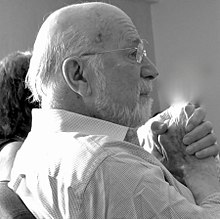Stanley Cavell

Stanley Cavell | |
|---|---|
 Stanley Cavell in Paris, 2015 | |
| Born | Stanley Louis Goldstein[1] (legally changed name to Stanley Louis Cavell in 1942) September 1, 1926 Atlanta, Georgia, U.S. |
| Died | June 19, 2018 (aged 91) Boston, Massachussets, U.S. |
| Education | University of California, Berkeley (B.A.) UCLA (no degree) Harvard University (Ph.D.) |
| School | Postanalytic philosophy[2] |
Main interests | Skepticism, tragedy, aesthetics, ethics, ordinary language philosophy, American transcendentalism, film theory, William Shakespeare, opera, religion |
Notable ideas | Philosophy of language film analysis |
Influences | |
Stanley Louis Cavell (/kəˈvɛl/; September 1, 1926 – June 19, 2018) was an American philosopher. He was the Walter M. Cabot Professor of Aesthetics and the General Theory of Value, Emeritus, at Harvard University. He worked in the fields of ethics, aesthetics, and ordinary language philosophy.
His influential works were on Wittgenstein, Austin, Emerson, Thoreau, and Heidegger. His work is seen and known by its conversational tone and many literary references.
Cavell died in Boston, Massachusetts of heart failure on June 19, 2018 at the age of 91.[3]
References[change | change source]
- ↑ David LaRocca, Emerson's English Traits and the Natural History of Metaphor, Bloomsbury Publishing, 2013, p. 318.
- ↑ Michael Adrian Peters, Education, Philosophy and Politics: The Selected Works of Michael A. Peters, Routledge, 2012, p. 210.
- ↑ "Stanley Cavell, Prominent Harvard Philosopher, Dies at 91". The New York Times. June 20, 2018. Retrieved June 21, 2018.
Other websites[change | change source]
- Harvard Philosophy Department website
- Conversations: The Journal of Cavellian Studies
- A Philosopher Goes to the Movies: Conversation with Stanley Cavell Archived 2017-01-20 at the Wayback Machine
- Daniel Ross, Review of Cavell, Philosophy the Day after Tomorrow
- A study (in French) on Cavell's idea of perfectionism Archived 2011-07-28 at the Wayback Machine
- Stanley Cavell Archived 2013-07-20 at the Wayback Machine